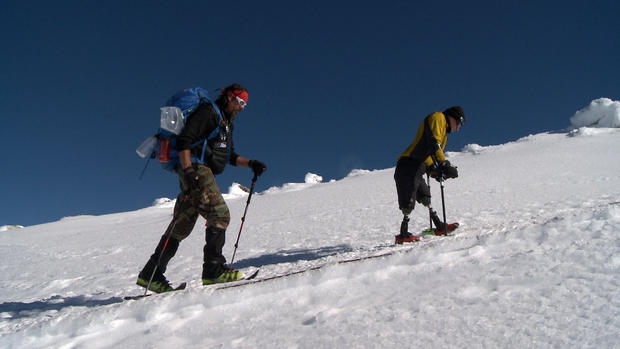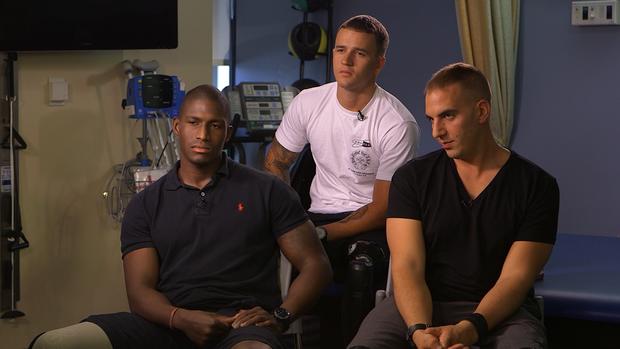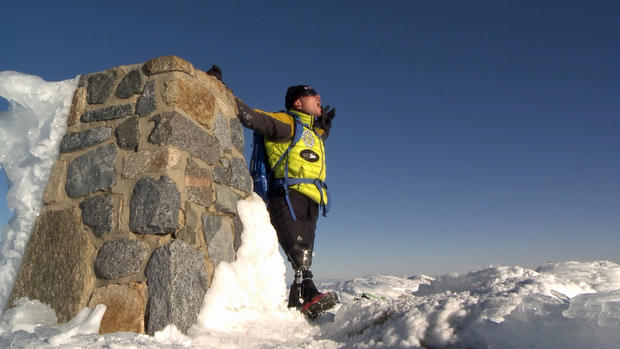Conquering the impossible
The following script is from "Up" which aired on Jan. 11, 2015. Lara Logan is the correspondent. Coleman Cowan and Max McClellan, producers.
There are few people in the world who have the skill or the will, to attempt to climb one of the world's Seven Summits, the tallest mountain on each continent.
Tonight, you'll meet young men who've done it with no legs.
Their bodies and their lives were shattered in the wars in Afghanistan and Iraq. But on the big mountains, they find a way to reclaim what they lost on the battlefield, going beyond the limits of their injuries to achieve what seems impossible.
At their side is a former Hells Angels biker named Tim Medvetz. He never served in the military, but on his journey to the top of Mount Everest, he says he found a way to help catastrophically wounded war veterans.
We joined Tim and a young Marine as they climbed up the tallest peak in Australia, and saw for ourselves how a mountain can change someone's life.
It was below freezing at 6,500 feet above sea level and Private First Class Isaac Blunt had hit the deep snow on Mount Kosciuszko. The most brutal part of his climb was just beginning and without knees, every stiff, awkward step he took was a battle.
[Tim Medvetz: Alright man. Get it on!]
His trainer, mentor, and self-appointed drill sergeant, Tim Medvetz, was pushing him every step of the way.
[Tim Medvetz: If you're going to fall, just fall straight back. I'm behind ya.]
By that afternoon, a severe storm had enveloped them in blinding snow and wind. Isaac was only halfway to the summit and he could barely move.
[Tim Medvetz: I need everything you've got. Otherwise, we're done.]
Their journey to this mountain started two months earlier in the hills outside San Diego. We met Isaac as he was starting to train with Tim, who was preparing him for long days in his new climbing prosthetic legs.
Lara Logan: What appeals to you about the thought of trying to climb a mountain?
Isaac Blunt: I knew that it was going to be a challenge. I would have to-- like, I'd have to get out of my chair. Have to start doing everything that I've been wanting to do.
Lara Logan: How would you describe the last two years for you?
Isaac Blunt: Hell.
Isaac was 20 years old when he was sent into the center of the fight against the Taliban in Afghanistan. A small town boy from Wisconsin, he grew up in a military family and all he ever wanted was to be a Marine. On patrol in Helmand Province in 2011, just three months into his deployment, Isaac stepped on an IED which blew away most of his lower body.
Isaac Blunt: They told me that I lost both my legs. They told me that unless I was able to move my fingers they were going to take my arm because I really messed up my bicep and my forearm.
Two weeks later, the doctors had to remove his eye.
Lara Logan: After you'd already lost your legs and nearly your arm, was that hard?
Isaac Blunt: I think the hardest part was finding out that my testicles were gone. Luckily, I have a daughter, though. And she's a miracle.
Isaac battled depression for the next two years and had all but given up on his recovery when he learned about tim medvetz and his work with other veterans who'd survived catastrophic injuries.
Lara Logan: Why did you choose Isaac?
Tim Medvetz: A lot of these guys, you get used to the wheelchair because it's easy. You know? Putting legs on is not easy. It's painful. It's work.
Lara Logan: And that's where Isaac is now?
Tim Medvetz: And that's where Isaac is now. And that's where I come in.
[Tim Medvetz: Kosciuszko! BAM!]
Tim chose the lowest of the seven summits for Isaac because of the severity of his injuries. But he also chose winter, the toughest time of year. Rehabilitation comes from the challenge, he says, not from making it easy.
Tim Medvetz: I have to give him a mountain that's like a Mount Everest to him. And with all those injuries he has and I'm going to take him up the hardest route. You factor all those things in there, I mean there's a good possibility he might not make it.
The first thing Isaac encountered at the base of the mountain was this dense underbrush covered in snow that tangled and twisted around his artificial legs. There was no trail, and with his prosthetics digging into his stumps, he painfully fought his way up the mountain.
With each step Isaac moved only a few inches and after seven hours of climbing on that first day, he'd barely made it a mile.
[Isaac Blunt: I'm not very good at blazing a trail.]
As darkness fell, Tim stayed at his side.
[Tim Medvetz: It's all about right now getting to camp.... It's all I want you to focus on.]
Isaac Blunt: There was a few points that I swear to God I thought my bone broke through my skin.
Isaac Blunt: I just wanted to tell Tim, like, "Dude, I can't do this. Like, I'm in way too much pain. I can't do this."
Tim Medvetz: At some point it becomes more mental than physical. And that's the part where it comes down to this and this (pointing).
Tim Medvetz would never tell you he knows what it's like to be wounded on the battlefield, but what helps him relate to injured veterans like Isaac, is his own experience of struggling to overcome life-threatening injuries from a motorcycle crash 13 years ago.
Tim Medvetz: Half of my back has a net cage around it, then bolted with six bolts and it's been fused. I have two metal plates in my head and 10 screws. I have two metal plates and 10 screws in my right hand.
Lara Logan: So you're a Hells Angel. You're a biker. You're a tough guy. What's it like to suddenly find yourself in this state? Completely vulnerable and broken.
Tim Medvetz: I would just, you know, cover the pain with, you know, 15, 20 Vicodins and whiskey.
At the bottom of a downward, destructive spiral, Tim picked up Jon Krakauer's book "Into Thin Air," about a hiking tragedy on Mount Everest in which eight people died. He says climbing Everest struck him as the ultimate way to prove to his doctors and himself that he was still capable of doing something that difficult. So with no mountain climbing experience and a body patched together with metal, he set his sights on conquering the world's highest peak.
Tim Medvetz: This was going to be my rehabilitation. 'Cause you gotta understand something. Like, for a guy like me to walk into these rehab place, these people doing these little-- you know, squeezing the ball thing and-- I like-- I turned around and walked out. I never did any physical therapy. For me that was just-- that wasn't enough.
Lara Logan: That was like dying?
Tim Medvetz: Yeah, it was like dying. Yeah, it was. And I felt like I was dying inside. So I needed a punch in the mouth. You know? And--
Lara Logan: And Mount Everest was that punch in the mouth?
Tim Medvetz: Mount Everest was that punch in the mouth.
Six years later, on his second attempt, Tim summited the mountain as part of the Discovery Channel series, "Everest: Beyond the Limit."
He says the experience got him off his pain pills and back on his feet. He became convinced it could do the same for injured war veterans, so he created what he calls "The Heroes Project" - a one-man organization that takes amputees where most able-bodied people wouldn't dare venture...from the frozen tundra of Antarctica... to the top of Mount McKinley, the highest peak in North America.
Tim Medvetz: Big mountains like that, they, you know, forget that they even lost their legs.
Lara Logan: Because if they can do that, they can do anything?
Tim Medvetz: They can do that, they can do anything.
These three young men were all wounded fighting the same enemy in Afghanistan as Isaac, and also recovered here at the Naval Medical Center San Diego, where Isaac was preparing for his climb.
Each one of them followed Tim Medvetz to climb one of the Seven Summits.
He took Marine Corporal Kionte Storey to the coldest place on Earth, Antarctica, where he struggled for two weeks to get to the top of Mount Vinson.
[Tim Medvetz: You deserve it man.]
Kionte Storey: Going through my injury, I lost myself. Didn't have a clue who I was. I got to that point where I was actually starting to hit that breaking point of, you know, you hit that suicidal plateau. And getting to the top of that mountain, I felt like I found who I actually was, who I am and what I can do.
And Staff Sergeant Mark Zambon traveled with him to Africa, where he conquered the continent's highest peak, Mount Kilimanjaro in Tanzania.
Mark Zambon: At that moment, it was like, you know, that answered it for me. That this injury, like, does not define my life. I define it. And life is still able to be powerfully lived, even in this condition.
[Tim Medvetz: You gotta dig deep man.]
And Corporal Brad Ivanchan went with Tim to South America, where he climbed 23,000 feet to the summit of Mount Aconcagua, less than a year after losing both his legs.
Brad Ivanchan: It's something that you can carry with you the rest of your life and it also helps you put a closure on a period in your life too. I don't know where I would be today if I had not done it. It's definitely improved my life significantly and my outlook on life significantly.
They all said it was the most physically demanding thing they had ever done in their lives.
Tim Medvetz: It's miserable. I mean high altitude mountaineering, it's just pure suffering. Period. You're freezing and you're starving. Your body's withering away. You're aching. You're-- it's just-- it's horrible.
Lara Logan: Sounds like hell. So why do people do it?
Tim Medvetz: For that moment. That five minutes on the summit. That accomplishment.
L
ara Logan: What if something happens to one of them? What if they do die on one of your climbs with you? Is that a conversation you have with them?
Tim Medvetz: Of course. Yeah. From day one. I mean I'm taking 'em to a mountain that, you know, people die on.
Lara Logan: It might happen?
Tim Medvetz: It might happen. And that's part of the recovery. And that's part of the rehabilitation.
Lara Logan: In what way?
Tim Medvetz: It's like deploying to Iraq. Deploying to Afghanistan. It's like going on a patrol every day. They don't know if they're coming back. You know? And that's a powerful, powerful, life-changing experience.
Back on Mount Kosciuszko, where the storm had grown stronger and more threatening, Isaac's mission had now become extremely dangerous. After three days, he was far from the summit.
[Tim Medvetz: If you don't make it to that path today, we go down. The expedition is done, finished. So, you've got to move quick.]
It's like deploying to Iraq. Deploying to Afghanistan. It's like going on a patrol every day. They don't know if they're coming back. You know? And that's a powerful, powerful, life-changing experience.
The storm turned into a whiteout, with 60 mile-an-hour winds and zero visibility.
Isaac Blunt: Once that storm hit, the only way I could actually follow the trail is if I had somebody literally two feet in front of me so I could see their snow shoes.
Isaac Blunt: There was a few times that, like, I'd sink in or something. And he-- the guy in front of me would get a little bit, like, further ahead. I'd look up, I couldn't see him.
Unable to move, the team hunkered down to wait out the storm. They were stranded for two long days. Just as they were reaching their limit...the skies cleared, leaving behind a hard icy surface on the mountain.
Isaac Blunt: I was able to move so much faster because all the snow was compact. I wasn't sinking. I wasn't having troubles with my side sticks. I could stay on top of the snow.
Isaac covered four miles in this one day - more ground than he had the entire expedition -- and the summit was now finally within his reach. But he still faced the most challenging part: the final 400 feet of vertical elevation to the top.
[Tim Medvetz: You in pain...? I know you're in pain.]
The five days Isaac Blunt had endured on Mount Kosciuszko were the first he'd spent without his wheelchair since losing his legs two years before.
Now he'd reached the top of one of the Seven Summits of the world.



